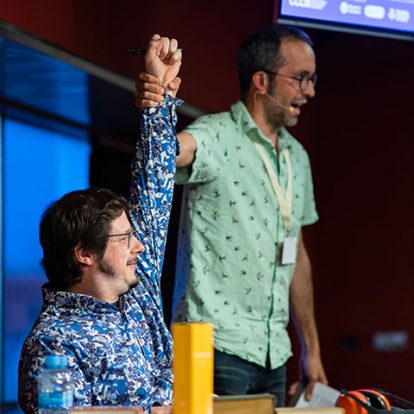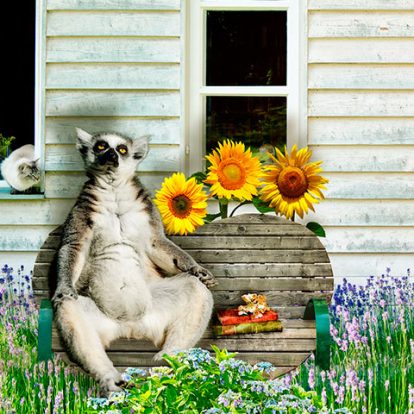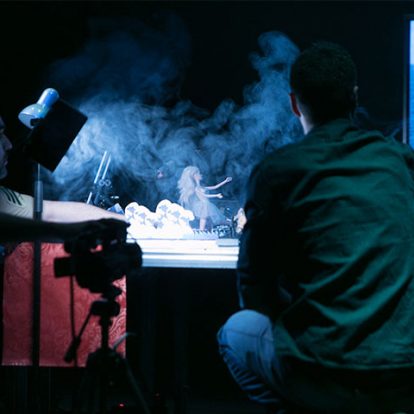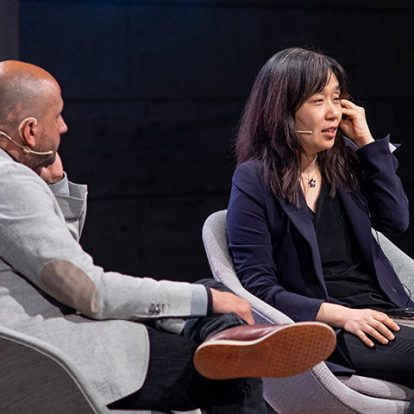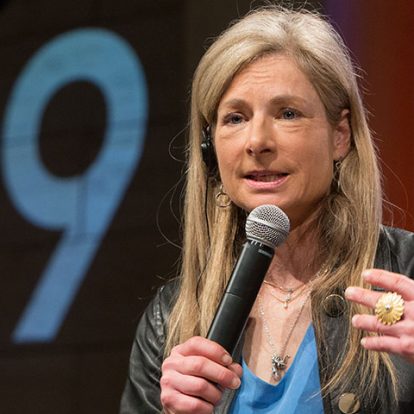Five itineraries to discover Kosmopolis
Eva Rexach (K Team)
12 March 2015
Each edition of Kosmopolis is a call to Serendipity. You might turn up to listen to a famous author and discover that what you should be reading is something else. Or perhaps attend a writing workshop and find a soulmate in an author you had never heard of. Kosmopolis is a place for falling in love with literature and for letting yourself be carried away by the very varied proposals that fill all the corners of the CCCB. And it can be enjoyed in many different ways. Here we suggest a few.
Itinerary 1. By themes
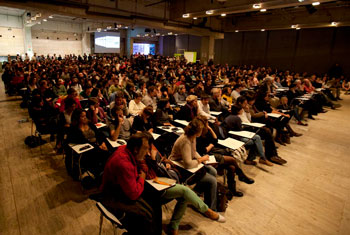
Audience at Kosmopolis 2010. © Albert Uriach / CCCB
This is the easiest way: choose any of this edition’s themes and play it safe. This year we have prepared six: the K Dialogues, seven meetings between writers to talk about literature and issues of our times; the anniversary of Alice’s Adventures in Wonderland, a tribute to the most famous work by Lewis Carroll, written 150 years ago; Journalism XXI, on the present and the future of literary journalism; The Sebald Legacy, a programme of activities related with the work of the German author; Translating Europe, about the importance of translation and the new reading canons; and The Writing Labs, meet-ups, workshops and performances on the kitchen of literature. Other thematic itineraries include Alpha Channel, the festival’s television channel; BookCamp, which is holding its fourth edition with over 20 meetings about the futures of books; activities for children and young people, for the younger and family audience; and the programme organised by Libraries of Barcelona, designed with librarians in mind but open to the general public.
Itinerary 2. By geographies
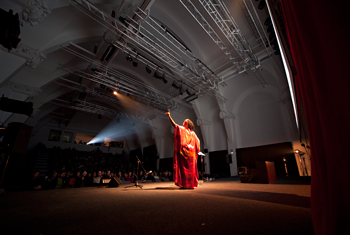
Malika Ndlovu. Kosmopolis 2011. © Carlos Cazurro / CCCB
From Greece to the United States, from Germany to Catalonia and from Spain and France to Ghana: Kosmopolis is a melting pot of cultures exemplified by the 150 participants in this year’s events. It is possible, therefore, to trace a kind of literary round-the-world trip. For example, to begin with what is closest, the dialogue between Juan Marsé and Josep Maria Cuenca, from El Guinardó, Barcelona and Spain; continue through France with Mathias Enard and Camille de Toledo, author of a treatise on the European melancholy that leads us on to travel to Greece with Vinicio Capossela. From Greece we can jump, guided by current politics, to the Germany of Abbas Khider, Marjana Gaponenko and Klaus Hübner, whose chat will be moderated by another Spaniard, Jordi Soler. With him, we will return to Southern Europe then continue on down to the Africa of Taiye Selasi and Xavier Aldekoa, and as Selasi was brought up in the United States, we will then visit William T. Vollmann, Rachel Kushner, Robert Coover and Jon Lee Anderson, all references in American letters for different merits. Without abandoning the Americas, we travel south to the Buenos Aires of Alberto Manguel, whose tribute to Alice serves as a pretext for us to return to England, where we are awaited by the gastronomic-cum-literary delights of Mina Holland.
Itinerary 3. By future
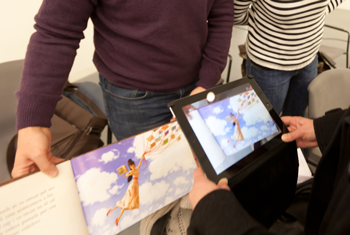
Bookcamp. Kosmopolis 2013. © CCCB
This is an itinerary for the daring: for people who want to know, today, the authors we will be talking about tomorrow. From the young promises of Catalan and Spanish culture commandeered by Jordi Nopca in El estómago de los escritores (Borja Bagunyà, Bel Olid, Unai Velasco, María Folguera, Nico Roig and Maria Rodés) to the writers that make up the new canon of literature that every year redefines Finnegan’s List.
However, this itinerary is also for those who want to know what will happen with literature itself, where the limits of books will lie, the latest new releases in digital literature, literary applications, forms of distribution and publishing. For these people, BookCamp is an unmissable event.
Itinerary 4. By moods
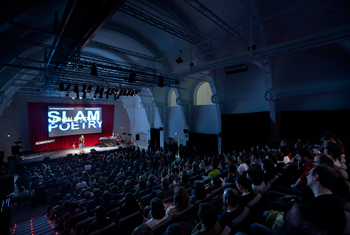
Slam Poetry. Kosmopolis 2013. © CCCB
Sebald’s work is a journey around the history of European culture, around its memory and recollections. And it is also a guide for the perplexed, a light to guide us in times of upheaval. The Sebald Legacy is, then, one of the subjects to be followed if one’s mood is swaying between melancholy and hope. Two dialogues, David Grossman together with Carles Torner and Cristina Rivera Garza together with Camille de Toledo, two films, Austerlitz and Patience (After Sebald) and an exhibition, Sebald Variations, make up this itinerary.
For the more optimistic and adventurous, Alice’s Adventures in Wonderland is a perfect excuse. Carroll’s little rebel girl, who is faced with the rigid rules of Victorian society, guides us towards a workshop of music, quantum physics and light that will undoubtedly offer surprises. Furthermore, the Gran Slam is always a guarantee of divertimento.
The rebels, those who refuse to accept that the end of journalism is near, should come along to the chat with Carles Capdevila, who will be proposing Seven reasons to believe in a great future for journalism. And, undoubtedly, the great chroniclers such as Martín Caparrós and Jon Lee Anderson will show why, with writers like them, journalism still has a long road ahead of it.
Itinerary 5. For film buffs and series buffs
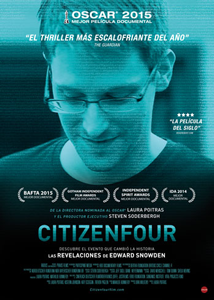
Cartell de Citizenfour
Those who prefer an audiovisual itinerary have it very easy: all they have to do is come along to Alpha Channel. Over fifty audiovisual pieces including films, documentaries, shorts and reports on literature, including the Alpha Nights: four essential screenings, two of them exclusive premieres: Gabo, la magia de lo real, Citizenfour, The Double and Indebito. And as a special prize, a Series Sunday, with premieres and chats with screenwriters and writers, thanks to a special collaboration with Canal +.
Five different routes, five different ways of enjoying Kosmopolis. But there are many more, as many as each visitor’s level of curiosity and imagination allow. Which is yours?

